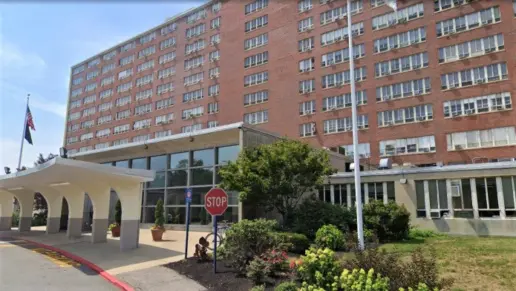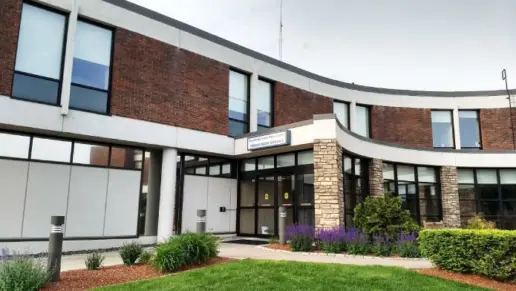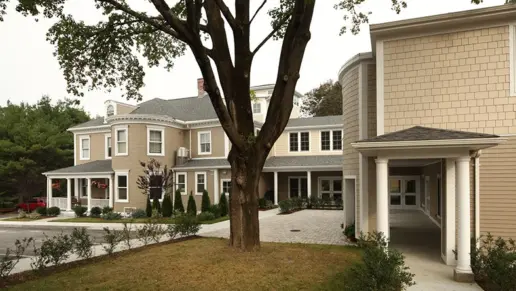About Providence VAMC – Hyannis CBOC
Hyannis VA Clinic can assist you in overcoming common behavioral issues. This includes substance use disorder and mental health conditions. They can also help you tackle co-occurring disorders. This is when someone is struggling with both mental issues and addictive behavior. This facility serves veterans in Hyannis, Massachusetts and neighboring communities. They offer primary care, addiction/substance use treatment and mental health care.
Their substance use program options include inpatient rehabilitation and outpatient therapy. Inpatient rehabilitation takes place at their residential facility. It is suitable if you’re dealing with severe substance misuse. The program may begin with intake assessment and personalized treatment planning. This may be followed by detox and inpatient rehabilitation.
Detox weans off addiction related toxins from your body. The procedure takes place in a therapeutic setting with 24/7 supervision by clinical experts. These experts may administer meds and provide therapeutic support. This is to ensure safe and comfortable withdrawal.
The clinical team will coordinate your transition to the inpatient rehab program once you’ve stabilized and are in good health. This highly structured program involves intense therapy sessions with 24/7 support from their staff. They offer individual counseling and group therapy that draws from clinically proven methods. Individual counseling enables you to set goals and tackle negative emotions fueling your substance misuse with the guidance of a trained counselor.
Group therapy inspires community support and engagement through peer interaction. It’s a great way to connect and share experiences with others facing similar challenges. This can boost your self esteem and confidence. It’s also a great way to build healthy relationships that strengthen your support network. It’s all about building strong coping skills, staying sober and preventing relapse. They also offer educational classes to help you better grasp the impact of addiction and the recovery pathways available to you.
You’ll receive medication assisted treatment (MAT) if relevant to your personalized care plan. This will most likely be the case if you’re dealing with opioid, alcohol or stimulant addiction. The technique uses meds approved by the FDA alongside counseling to support recovery. Psychiatric care like medication management is also provided to support veterans with cooccurring conditions.
You can step down to outpatient therapy for lasting recovery upon graduating from their inpatient residential treatment. Outpatient therapy is very flexible and involves fewer therapy sessions. Sessions are scheduled to accommodate your work and family commitments. So you won’t quit work to attend therapy sessions. That said you’ll have access to the same therapeutic support as your inpatient treatment. This includes individual and group therapy that enables you to address the underlying causes of your substance misuse.
Their complete recovery programming is complemented by social support services. This includes housing support for homeless veterans, unemployment assistance and health maintenance. The facility accepts multiple funding options to make payment easy. This includes commercial and public insurance like Medicare, Medicaid and TRICARE. You can pay out of pocket in person, online and via mail. They support same day help and telehealth visits. You may qualify for care even if you’re not enrolled in the VA health care.
Latest Reviews
Rehab Score
Other Forms of Payment
Private insurance refers to any kind of healthcare coverage that isn't from the state or federal government. This includes individual and family plans offered by an employer or purchased from the Insurance Marketplace. Every plan will have different requirements and out of pocket costs so be sure to get the full details before you start treatment.
Self-pay involves paying for treatment out of your own pocket. You can use savings or credit, get a personal loan, or receive help from family and friends to fund your treatment. If you don't have insurance or your insurance plan doesn't cover a specific program, self-pay can help ensure you still get the care you need.
Military members, veterans, and eligible dependents have access to specific insurance programs that help them get the care they need. TRICARE and VA insurance can help you access low cost or no cost addiction and mental health treatment. Programs that accept military insurance often have targeted treatment focused on the unique challenges military members, veterans, and their families face.
Financial aid can take many forms. Centers may have grants or scholarships available to clients who meet eligibility requirements. Programs that receive SAMHSA grants may have financial aid available for those who need treatment as well. Grants and scholarships can help you pai for treatment without having to repay.
Sliding scale payments are based on a client's income and family size. The goal is to make treatment affordable to everyone. By taking these factors into account, addiction recovery care providers help ensure that your treatment does not become a financial burden to you or your family, eliminating one barrier to care.
Medicaid is a state based program that helps lower-income individuals and families pay for healthcare. Medicaid covers addiction treatment so those enrolled can use their coverage to pay for rehab. When a program accepts Medicaid the client often pays very little or nothing out of their own pocket.
Addiction Treatments
Levels of Care
Treatments
Mental health rehabs focus on helping individuals recover from mental illnesses like bipolar disorder, clinical depression, anxiety disorders, schizophrenia, and more. Mental health professionals at these facilities are trained to understand and treat mental health issues, both in individual and group settings.
Programs




Clinical Services
Cognitive Behavioral Therapy (CBT) is a therapy modality that focuses on the relationship between one's thoughts, feelings, and behaviors. It is used to establish and allow for healthy responses to thoughts and feelings (instead of unhealthy responses, like using drugs or alcohol). CBT has been proven effective for recovering addicts of all kinds, and is used to strengthen a patient's own self-awareness and ability to self-regulate. CBT allows individuals to monitor their own emotional state, become more adept at communicating with others, and manage stress without needing to engage in substance abuse.
Whether a marriage or other committed relationship, an intimate partnership is one of the most important aspects of a person's life. Drug and alcohol addiction affects both members of a couple in deep and meaningful ways, as does rehab and recovery. Couples therapy and other couples-focused treatment programs are significant parts of exploring triggers of addiction, as well as learning how to build healthy patterns to support ongoing sobriety.
Experiential therapy is a form of therapy in which clients are encouraged to surface and work through subconscious issues by engaging in real-time experiences. Experiential therapy departs from traditional talk therapy by involving the body, and having clients engage in activities, movements, and physical and emotional expression. This can involve role-play or using props (which can include other people). Experiential therapy can help people process trauma, memories, and emotion quickly, deeply, and in a lasting fashion, leading to substantial and impactful healing.
Research clearly demonstrates that recovery is far more successful and sustainable when loved ones like family members participate in rehab and substance abuse treatment. Genetic factors may be at play when it comes to drug and alcohol addiction, as well as mental health issues. Family dynamics often play a critical role in addiction triggers, and if properly educated, family members can be a strong source of support when it comes to rehabilitation.
Group therapy is any therapeutic work that happens in a group (not one-on-one). There are a number of different group therapy modalities, including support groups, experiential therapy, psycho-education, and more. Group therapy involves treatment as well as processing interaction between group members.
In individual therapy, a patient meets one-on-one with a trained psychologist or counselor. Therapy is a pivotal part of effective substance abuse treatment, as it often covers root causes of addiction, including challenges faced by the patient in their social, family, and work/school life.
Life skills trainings involve all the skills a person must have in order to function successfully in the world. These include time management, career guidance, money management, and effective communication. Truly successful addiction recovery is based on the ability to not only live substance-free, but to thrive. Life skills teaches the practical necessities of functioning in society, which sets clients up for success in life, and therefore sobriety.
Nicotine Replacement Therapy (NRT) is a way of getting nicotine into the bloodstream without smoking. It uses products that supply low doses of nicotine to help people stop smoking. The goal of therapy is to cut down on cravings for nicotine and ease the symptoms of nicotine withdrawal.
Nutrition therapy, aka medical nutrition therapy (MNT), is a way of treating physical, emotional, and medical conditions through diet. Specific dietary plans are designed by professional nutritionists or registered dietitians, and patients follow them in order to positively affect their physical and mental health.
Trauma therapy addresses traumatic incidents from a client's past that are likely affecting their present-day experience. Trauma is often one of the primary triggers and potential causes of addiction, and can stem from child sexual abuse, domestic violence, having a parent with a mental illness, losing one or both parents at a young age, teenage or adult sexual assault, or any number of other factors. The purpose of trauma therapy is to allow a patient to process trauma and move through and past it, with the help of trained and compassionate mental health professionals.
Amenities
-
Residential Setting
Accreditations

The Joint Commission, formerly known as JCAHO, is a nonprofit organization that accredits rehab organizations and programs. Founded in 1951, the Joint Commision's mission is to improve the quality of patient care and demonstrating the quality of patient care.
Joint Commission Accreditation: Yes
Accreditation Number: 5653

The Substance Abuse and Mental Health Services Administration (SAMHSA) is a branch of the U.S. Department of Health and Human Services. Established in 1992 by congress, SAMHSA's mission is to reduce the impact of substance abuse and mental illness on American's communities.
SAMHSA Listed: Yes
Contact Information
233 Stevens Street
Barnstable, MA 02601


